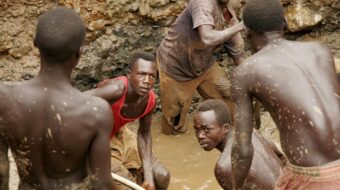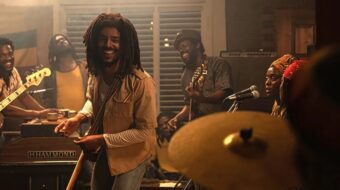RUSTENBERG, South Africa — The vuvuzela horns are destined to be one of the lasting remembrances of the 2010 World Cup held here in South Africa. The name for the horn is from the Zulu term “make noise” and indeed it’s hard to imagine a better term than this for the loud instruments have been raising the roof off the stadiums in South Africa for the last few decades.
A similar instrument, known as the corneta, is used in Brazil and other Latin American countries.
The vuvuzela was created by members of the Nazareth Baptist church around 1910. The religion was started by Isaiah Shembe and combines both Christian and African cultural traditions as reflected in the Zulu tribe.
To the noise of the horn, the Shembe followers each year walk barefoot for a three day pilgrimage from Durban to their holy mountain, Nhlangakazi, in homage to their founding father who they consider to be an African prophet with extraordinary healing powers on a higher level than Jesus.
Of course the religious connotations of the vuvuzela’s have led to controversies. “Football is stealing pleasure from Shembe. When people are playing football and hearing the vuvuzela, they are getting the power of our holy spirit” one follower noted.
Indeed the vuvuzela reflects a spirit of football within Africa that is difficult to contemplate from the staid confines of Europe or the U.S.A. The horns have been controversial but in refusing to ban them from the games, to his credit, FIFA President Sepp Blatter responded, “We should not try to Europeanize an African World Cup … that is what African and South Africa football is all about – noise, excitement, dancing, shouting and enjoyment.”
One can be a bit ambivalent about the vuvuzela horns but the Shembe church is being paid royalties for the use of their unique invention by the manufacturers, and even some of my most reserved friends in the posh suburbs of Pretoria find time to blow them in joyous revelry every chance they get.
On the other hand, during the match between Ghana and Australia I watched an amazing scene. As I sat in the midst of fans from both clubs the Australians who were mostly white and the Ghanaians who were mostly black, I saw a small boy of eight or nine years in the row in front of me who was nonplused by the action on the field but fascinated by the crowd around him. The boy wore huge sunglasses, a makarapa hat decorated in the colors of Ghana, and held a vuvuzela horn in hand. His parents, white South Africans, were cheering for Ghana. During the early part of the match the parents periodically rose or cheered as the action flowed on the field. The boy watched inattentively. Then a few of the locals came into the stands and occupied the seats directly below him and a couple of them had vuvuzelas, which they proceeded to blow wholeheartedly. As the vuvuzela horns blew almost as one, the crowd of Ghanaian supporters became animated. Some of the men beat their drums, the women began to dance and the boy looked over at his dad who signaled that it was ok, so the boy joined in and blew his vuvuzela.
Not to be outdone the Australian fans blew their vuvuzelas and cheered on their team. For the next hour the kid was lively and had the time of this life. By the end of the game I doubt that the boy knew the score but he had had a blast. He had shared one of life’s bright moments a 2010 World Cup football game on a day to remember with mom and dad.
Although the Africans have only one team, the Black Stars of Ghana, left in this World Cup and I am closely linked to Ghana through many friends and relatives, as an African Americans I am going to be cheering for the USA and damn the consequences. I almost went hoarse on Wednesday evening cheering for the USA and I’ll shout and blow my vuvuzela’s to the rafters this evening rooting for them again. It’s gonna be an uphill battle for the U.S. team but no matter who wins let the games continue.
Related stories:












Comments